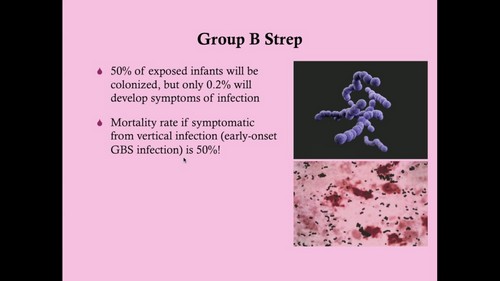Group B Streptococcus (GBS) is a bacteria which is found in the gastrointestinal and genital tracts of 10-30% of women. It is usually harmless in non-pregnant women, but it can cause problems for pregnant women and newborn infants.
What is GBS?
What problems can GBS cause?
For the mother:
- Having GBS usually causes no problems, but it can lead to urinary tract infection.
- More serious infections are very rare but, if they do occur, can lead to premature delivery.
For the baby:
- If the mother has GBS at the time of vaginal delivery, there is a 40-70% chance of the baby contracting it at the time.
- If the baby does pick up GBS, there is a 1-2 percent chance of a severe infection – which may be life threatening.

How is infection of the baby prevented?
Giving antibiotics through an intravenous drip during labour has been shown to markedly reduce the rate at which babies contract GBS at vaginal delivery.
The five reasons antibiotics are given during labour to prevent early-onset GBS disease (EOGBSD) for the baby are:
- Premature labour (labour before 37 weeks)
- Prolonged rupture of membranes (>18 hours)
- Maternal fever (> 38degC)
- Positive GBS culture on swab or urine test during this pregnancy
- The mother having had a previous infant affected by EOGBSD
How do we check for GBS in pregnancy?
There are currently two schools of thought regarding screening for GBS in pregnancy.
1. Universal screening:
- This involves taking a swab from the lower vagina and anus between 35-37 weeks of pregnancy.
- If the result is negative, no IV antibiotics are given in the absence of other risk factors.
- If the result is positive, IV antibiotics during labour would be recommended.
2. Screening based on risk-factors:
- This involves using the five criteria outlined above alone to determine whether or not a woman in labour requires IV antibiotics.
Both of these approaches to screening for GBS are sound, so it is recommended that you and your obstetrician have a discussion regarding which approach you both are most comfortable with.
What happens to my baby after birth if I needed antibiotics to prevent GBS?
The paediatric doctor will discuss follow-up in detail with you. Generally, observation of the baby is all that is required if at least two doses of antibiotics are given prior to you having your baby.
If there wasn’t time for two doses to be given, then your baby may require antibiotics for a short period of time.



